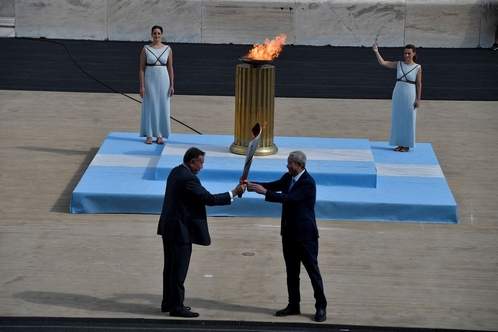BEIJING, China (AFP) — The Olympic flame arrived in China early Wednesday for the Beijing 2022 Winter Games, state media reported, following a ceremony in Athens overshadowed by protests over China’s human rights record.
Beijing — set to become the first host of a Summer and Winter Games — will hold a welcome ceremony for the flame at 10:00 am (0200 GMT) at the capital’s Olympic Tower, where it will go on display to the public, before setting off on an exhibition tour.
Around 2,900 athletes, representing approximately 85 National Olympic Committees, will compete in the Winter Games from February 4-20, 2022.
The flame was lit in Athens on Monday and transferred the following day to the organisers of the Beijing Games.
The low-key event was held in front of a limited audience because of the coronavirus, and in a break with tradition, there was no torch relay on Greek soil.
But rights campaigners accuse the International Olympic Committee of turning a blind eye to what they say is a litany of abuses in China, notably over Tibet, its treatment of Muslim minorities in the region of Xinjiang and its clampdown in Hong Kong.
Activists grabbed the spotlight at Monday’s lighting ceremony, unfurling a Tibetan flag and a banner that read “no genocide” before Greek police intervened.
A similar protest was held at the Acropolis in Athens on Sunday.
When Beijing hosted the 2008 Games, the relay was repeatedly disrupted by protesters in Europe and North America.
There is highly unlikely to be any such sign of dissent in tightly-controlled China, where Beijing has repeatedly swatted aside talk of a boycott as “politicising sport”.
Beijing 2022 organisers have released few details of what they plan, but the IOC has said the flame will go on display to the public at the tower, near the Bird’s Nest Stadium which hosted the opening ceremony for the 2008 Games.
“Closer to the Games, a traditional Olympic torch relay will be held,” the IOC said this week, with the Games just over 100 days away.
– Calls to postpone –
Rights groups say more than one million Uyghurs and other minorities in Xinjiang have been held in camps in recent years, their rights to worship and freedoms heavily curtailed by Chinese authorities.
Washington has described the treatment of China’s Uyghurs as “genocide”.
After initially denying the existence of the Xinjiang camps, China later defended them as vocational training centres aimed at reducing Islamic extremism.
IOC chairman Thomas Bach has batted off talk of a potential boycott, claiming the International Olympic Committee’s political neutrality and saying it was up to governments to live up to their responsibilities.
A victim of the 1980 Moscow Games boycott, the former fencer has said such moves only punish athletes, and insists the IOC is addressing the rights issue “within our remit”.
“In these difficult times we are still living through, the Olympic Winter Games Beijing 2022 will be an important moment to bring the world together in a spirit of peace, friendship and solidarity,” Bach said on Monday.
It will be the second Olympics to be held under the shadow of the coronavirus pandemic after the Tokyo Games earlier this year and athletes competing in Beijing face strict rules to contain the risk of COVID-19 cases.
Participants will stay in a “closed loop” bubble to thwart infections, with athletes having to be either fully vaccinated or face 21 days’ quarantine.
Tickets to the events will only be sold to people living in China.
China has largely sealed its borders since the virus emerged there towards the end of 2019, which has slowed the number of daily infections to a trickle.
But around 2,000 overseas athletes, coaches and team officials are currently involved in test events in the capital, which have given a strong taste of how authorities will handle next year’s Games.







 and then
and then